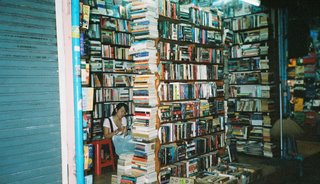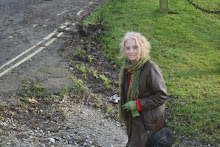Getting Hooked On The Ko San Road...

What on earth IS the connection between a picture of a second hand bookshop on the Ko San Road Bangkok and the following BlogPost about an evening class on the outskirts of a small(ish) UK city????
It's this: in July,I found a superb collection of short stories in the bookshop ; the book was Alice Munro's wonderful "Hateship, friendship, courtship, loveship, marriage"
The title, like the open frontage of the bookshop, well and truly hooked me in.... so I bought the book, read it on the long flight home, and a few months later, I find we're discussing the start of one of Munro's brilliant stories in a writing class one chilly November evening..
Here's the story:Last Wednesday I sauntered back to an old stamping ground of which I'm very fond; this is the highly successful writing group at Dorin Park, run by Liverpool writer and publisher of Headland Press, Gladys Mary Coles. This week, they had a special visitor, Merseyside writer David Evans, who came to talk on the art of short story writing.
It proved to be a fascinating evening;David is both informative and entertaining and I enjoyed being back, if only for an evening. I'd previously attended D Park sessions for six years and they became a highlight of my week. Those sessions fanned my interest in writing;they led to new activities, new friends and a change of direction in my working life..
David Evans is an accomplished writer, also a most interesting tutor. He draws on his own life experiences; this results in crisp absorbing work. His history is intriguing. As a journalist in South Africa during apartheid, he was imprisoned for political beliefs for five years. On release, he came to Liverpool where he now lives with his partner, writer and tutor Jenny Newman. She herself was once a nun, but left her convent after many years and has since written brilliantly about her experiences. It's a sobering thought that both Newman and Evans led lives in closed communities, be they vastly different ones.
Jenny's book, based on her experiences, is called " Going In" . David's novel " A touch of the sun" ( a " play" on the words sun/sun) was published last year and is based on the life and times that he knew. This book, like Jenny's, was well received. It tells the tale of a young South African journalist from the South African town of Victoria, who becomes embroiled in decisions both political and personal. Jimmy McGovern ( a son of Liverpool, if ever there was one..) describes the book as having:"a sense of place,a sense of time, honesty, messy humanity.."
I'd actually been in David's company before. However, I don't think he remembered the sodden-haired creature he met previously and I'm quite relieved about that.
One very wet evening in April, a friend and I staggered out of a Liverpool railway station ( umbrella-less and lightly dressed) into a Scouse version of the Monsoon. I'm not exagerating.It's not often the average Liverpudlian stares speechlessly up into the sky but that evening, several did; the deluge was ceaseless, almost unbelievable in its tropical violence.
And as the rain lashed, my friend and I fell into a taxi (steamed-up windows, the smell of damp leather, someone's forgotten red spotted brolly lolling on a seat), eventually arriving soaking wet at a wine bar in Hardman St for the launch of David Evans' new book of short stories. This was the excellent " Portrait Of A Playboy" which I thoroughly recommend. In fact, after reading it, I gave it to one of my sons; he too endorsed it as a great read.
And back to last week. My friend Pat ( who has attended Gladys Mary's classes for ten years ) invited me to last week's session. I was pleased to be invited back and particularly interested to learn more through David Evans about the art of the short story.
David's favourite short story writers include Chekov, Dorothy Parker, VS Pritchett, Michele Roberts, Alice Munro** ( see end of this Post ) James Lasden. The last mentioned writer recently won the acclaimed Arts Council shory story prize for his " Peter Kahn's third wife" . David also descibed how he came to write himself, how as a boy at school he won a prize for his writing, only to be told by his Head: " But don't go thinking you've made it yet!"
We then discussed certain ingredients said to be keys to the successful short story.
David believes SOMETHING should happen, even if only internal; a glimpse into a life should be a GOOD glimpse. He's saying, I think, there should be movement "of a kind" even if it's merely a character coming to a conclusion about something simple , or making a decision about a detail in their life.
David also said writers should take risks, should challenge conventional wisdom. They should, we felt too, follow their own instincts. Nobody ever did anything new, without bearing that in mind. But it's easier said than done!
Too many characters in a short story confuse. Of course there's always the theory that rules are there to be broken and sometimes THAT works brilliantly... That's "the thing" about creative writing; it grows, it's organic, it often does it's own thing. That, I think, is one aspect of "taking risks".
David believes, and we agreed, that dialogue should " push" action, not waste time. Information should be given through well chosen dialogue, character's thoughts, how they behave.
Description should be minimal; what's used should be concise, well-chosen. A "busy" urban street is best peopled with characters who show this, who show their uniqueness, with detail that creates " atmosphere" ; a setting casn be created with a couple of phrases.
The title of a story ( or book) matters; it should " hook" the reader, intrigue, make them keen to read on. ( As I was, on seeing Munro's book title in Thailand...)
Openings are crucial for the same reason; David cited the opening to Alice Munro's first story in " Hateship, Friendship..." ( its name is the title of the book) :" Years ago, before the trains stopped running....., a woman with a high, freckled forehead and a frizz of reddish hair, came into the railway station and inquired about shipping furniture..." Immediately, readers ask questions. Who is she? What's going on in this woman's life?
All these points are ingredients in a well baked short story. But like the best, most innovative recipes, writers do their own thing, find their own methods..
**Alice Monro has the knack of blending bizarre with ordinary; this is, I suppose, what life's about. She can be funny, she can be movingly sad, all within the same paragraph.
One of her best stories is "Family Furnishings". There's a fabulous description of a family meal, where "our family...put boards in the diningroom table".... where" there had to be far too much to eat, and most of the conversation had to do with the food, with the company saying how good it was and being urged to have more, and saying they couldn't, they were stuffed, and then the aunts' husbands relenting, taking more and saying they shouldn't, they were ready to bust.....And dessert still to come.........And everybody went on cutting, spooning, swallowing, in the glare of the fresh tablecloth, with the bright light pouring in through the newly washed windows. These dinners were always in the middle of the day.."
NB to me: Read this book again!


0 Comments:
Post a Comment
<< Home